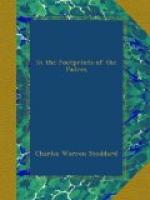[Illustration: Interior of the El Dorado]
In some parts of that strange street, where everybody was very busy but apparently never accomplished anything, there were no fronts to the rooms on the groundfloor. If those rooms were ever closed—it seemed to me they never were,—some one kindly put up a long row of shutters, and that end was accomplished. When the shutters were down the whole place was wide open, and anybody, everybody, could enter and depart at his own sweet will. This is exactly what he did; we did it ourselves, but we didn’t know why we did it. The others seemed to know all about it.
There was a long table in the centre of each room; it was always surrounded by swarms of Chinamen. Not a few foreigners of various nationalities were there. They were all intensely interested in some game that was being played upon that table. We heard the “chink” of money; and as the players came and went some were glad and some were sad and some were mad. These were the gambling halls of Chinatown. They were not at all beautiful or alluring to the eye, but they cast a spell over the minds and the pockets of men that was irresistible. Nowadays the place is kept under lock and key, and you must give the countersign or you will be turned away from the door thereof by a Chinaman whose face is the image of injured innocence.
The authors of the annals of San Francisco, 1854, say:
“During 1853, most of the moral, intellectual, and social characteristics of the inhabitants of San Francisco were nearly as already described in the reviews of previous years. There was still the old reckless energy, the old love of pleasure, the fast making and fast spending of money; the old hard labor and wild delights; jobberies, official and political corruption; thefts, robberies, and violent assaults; murders, duels and suicides; gambling, drinking, and general extravagance and dissipation.... The people had wealth at command, and all the passions of youth were burning within them; and they often, therefore, outraged public decency. Yet somehow the oldest residenters and the very family-men loved the place, with all its brave wickedness and splendid folly.”




